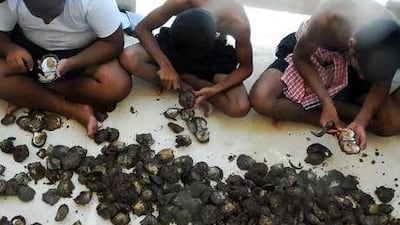KUWAIT CITY // For young men like Ahmed al Qallaf, it would be tempting to spend a summer break from university lounging in front of the television, socialising in cafes and spending extra hours in bed.
Instead, the Kuwait University technology student decided to test his mettle in Kuwait Sea Sports Club's Pearl Diving Heritage Revival Festival. The nine-day voyage pushes more than 200 young men to their physical limit as they crew traditional sailing dhows and diving for pearls using the tools and techniques of the ancient trade. "When I signed up I wasn't expecting this. I didn't think I'd be sleeping in the dust and diving for so many hours without a break," said Mr al Qallaf, 20, a first-year diver, or ghawwa, during a party in Khairan Port on the fifth day of the trip on Monday. "But I love the physical activity; I'll be back next year."
The 22-year-old festival is an attempt to keep alive the traditions of pearl diving, an industry once central to the Gulf's economy in the 19th Century. For one month before setting sail, the young men learned how to sail, dive, prepare the boats and sing songs as Kuwaitis did in the past. The fleet of 15 dhows and two support vessels began its voyage on July 15. Some of the sailors liked the idea of keeping Kuwait's heritage alive, such as Mr al Qallaf, who belongs to the country's most famous dhow-building family. Others are in it for the camaraderie.
Ahmed al Khaldi, 16, a student, said: "The best part is that you get a good tan because it's forbidden to wear sun cream", revealing a prominent tan-line and enough skin to send his colleagues into ruptures of laughter. "Keeping the traditions alive is the most important part - but it's good that the girls are impressed too," the diver on his second voyage said. The captain, or nakhuda, of one of the fleet's diving ships, Mohammed al Najar, 25, said the evenings are for joking, games and songs, but when the crews wake up at 5.30am for a breakfast of dates and coffee, the mood is focused and serious. "When you are out on the sea, you often think you don't want to come back, but every year you can't resist," said Mr al Najar, a navy officer on his 13th trip. The crew use ropes to reel in the divers and their catches after they free-dive using only a wooden nose clip to the seabed and the only protection from the powerful summer heat are strips of material hung across the deck. Virtually the only modern inventions used are engines on five of the boats, deliveries of ice from supply ships and the occasional can of soda or tinned cheese.
The sparse life has proved too much for some of the young men, who are aged between 14 and 25. Ali Qabandi, the manager of the event, said of the 250 who started the journey, about 40 pulled out "because some of them got fed up, they're used to housemaids and air conditioning - here, they do everything". "Discipline is the first thing we teach them. We have more discipline than the army. Life on the sea is different. They have to be patient, have respect and do what they're told." Jawad al Qallaf, 54, a retired cargo ship captain who is in charge of one of the supply ships, is one of the club's disciplinarians. Yesterday, as he motored some of the young sailors to their boats anchored at the oyster fields, he had harsh words for the boys who had delved into a stash of cold water without permission. The boys gave no backchat as they were scolded in a military fashion. While strict discipline put some sailors off, others struggled with the strenuous and dangerous nature of the work. Akeel Ashkanani, 26, a schoolteacher who is captaining one of the dhows, said some divers had cut their hands collecting the sharp oysters and others were stung by jellyfish, which they soothed with vinegar. "This is normal, in fact, it's an essential part of the trip."
The rewards for the divers have been sparse. Mr Ashkanani estimates his divers have gathered as little as a quarter of the pearls as they had by this time last year. He said divers who plunder the oyster beds using diving equipment throughout the year - which is illegal - are the cause of the poor catch. "The government is trying to stop them, but they can't do anything." Last year's divers collected about 600 pearls, which were gifted to the emir and then handed back to the club, but the 130,000 Kuwaiti dinars (Dh1.65 million) cost of the trip does not need to be covered by the catch. The money is provided by sponsors, donations from sports clubs and a collection by the members of the Emiri Diwan. The manager, Mr Qabandi, believes the event is growing in popularity. Last year, the fleet sailed to Bahrain for the first time and next year, they will take a trip to Qatar, which is planning to launch its own boats too, he said. "We normally launch 10 to 12 boats, but the special thing about this year is that we had 15 for the first time. It's growing in popularity," he said. jcalderwood@thenational.ae

